World
Israel’s Defense Minister Issues Dire Warning Over Gaza City

Israel’s Defense Minister, Israel Katz, issued a stark warning that the largest city in the Gaza Strip, Gaza City, could face severe destruction unless Hamas complies with Israel’s demands. His comments came as the region grapples with a worsening humanitarian crisis characterized by famine, according to the United Nations’ leading authority on food security.
Katz’s remarks followed a declaration by Prime Minister Benjamin Netanyahu that he would authorize a major military operation aimed at seizing control of Gaza City. Katz emphasized that the situation could deteriorate further, stating, “The gates of hell will soon open on the heads of Hamas’ murderers and rapists in Gaza — until they agree to Israel’s conditions for ending the war.” He reiterated Israel’s requirements for a ceasefire, which include the release of all hostages and the complete disarmament of Hamas.
Negotiations to secure the release of hostages have been a focal point of discussions. While Hamas has signaled a willingness to release captives in exchange for an end to hostilities, it has firmly rejected disarmament without the establishment of a Palestinian state. Netanyahu indicated that he had instructed officials to “begin immediate negotiations” to resolve the crisis, although it remains uncertain whether this signals a return to the long-standing discussions mediated by Egypt and Qatar.
Impending Military Operation and Humanitarian Concerns
The anticipated military offensive in Gaza City could commence within days. Israeli ground troops are already engaged in strategic areas, and military officials assert that Gaza City continues to serve as a stronghold for Hamas, with extensive networks of militant tunnels. The city is densely populated, housing hundreds of thousands of civilians, many of whom have already fled from other conflict-affected areas. It also contains vital infrastructure, including medical facilities.
Despite the potential for escalation, Israel may consider a recent ceasefire proposal that suggests a phased approach involving hostage and prisoner exchanges, coupled with a gradual withdrawal of Israeli troops. This proposal has been met with skepticism from Israeli leaders, particularly following the abandonment of a similar agreement earlier in the year due to pressure from Netanyahu’s far-right coalition allies.
Many Israelis are apprehensive that a military assault could jeopardize the lives of approximately 20 hostages believed to be alive since the Hamas-led attack on October 7, 2023, which resulted in the deaths of around 1,200 people, primarily civilians.
Escalating Violence and Humanitarian Toll
As tensions rise, airstrikes have intensified in Gaza City. On Friday, the Shifa Hospital reported that at least 17 Palestinians were killed as Israel ramped up its military activities in preparation for the broader offensive. An Israeli airstrike struck a school in the Sheikh Radwan neighborhood, where many displaced Palestinians were seeking refuge. Eyewitness accounts and hospital records indicated that the strike resulted in at least seven fatalities.
The Israeli military stated it was not aware of the specific strike but confirmed that its troops were operating on the outskirts of Gaza City and in the Zeitoun neighborhood. Witnesses have described the bombardment as relentless, with civilians like Amal Aboul Aas expressing despair over their situation. Aboul Aas, who has been displaced multiple times, stated, “We do not have the money, the resources, or the energy to evacuate again. I just wish for a quick death right where I am here because I am not going anywhere.”
According to the Gaza Health Ministry, the ongoing conflict has resulted in the deaths of at least 62,263 Palestinians. Additionally, malnutrition-related deaths have risen to 273, including 112 children. The ministry, which operates under Hamas, has not specified whether those killed were civilians or combatants, but it reported that approximately half of the deceased are women and children. Many independent observers and the U.N. regard these figures as the most reliable estimates of wartime casualties.
While Israel disputes these casualty figures, it has not released its own estimates. The international community continues to call for an immediate resolution to the conflict, emphasizing the urgent need for humanitarian access to those affected by the violence.
This escalating situation highlights the complexities and challenges facing both military operations and humanitarian efforts in the region, as leaders navigate a path toward a potential resolution.
-

 Lifestyle4 months ago
Lifestyle4 months agoLibraries Challenge Rising E-Book Costs Amid Growing Demand
-

 Sports3 months ago
Sports3 months agoTyreek Hill Responds to Tua Tagovailoa’s Comments on Team Dynamics
-

 Sports3 months ago
Sports3 months agoLiverpool Secures Agreement to Sign Young Striker Will Wright
-

 Lifestyle3 months ago
Lifestyle3 months agoSave Your Split Tomatoes: Expert Tips for Gardeners
-

 Lifestyle3 months ago
Lifestyle3 months agoPrincess Beatrice’s Daughter Athena Joins Siblings at London Parade
-

 World3 months ago
World3 months agoWinter Storms Lash New South Wales with Snow, Flood Risks
-

 Science4 months ago
Science4 months agoTrump Administration Moves to Repeal Key Climate Regulation
-

 Science3 months ago
Science3 months agoSan Francisco Hosts Unique Contest to Identify “Performative Males”
-

 Business4 months ago
Business4 months agoSoFi Technologies Shares Slip 2% Following Insider Stock Sale
-

 Science4 months ago
Science4 months agoNew Tool Reveals Link Between Horse Coat Condition and Parasites
-

 Sports3 months ago
Sports3 months agoElon Musk Sculpture Travels From Utah to Yosemite National Park
-

 Science4 months ago
Science4 months agoNew Study Confirms Humans Transported Stonehenge Bluestones








